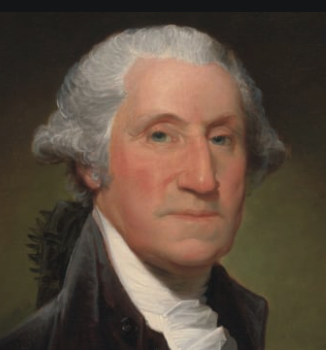George Washington: Thoughts on Political Parties, 1796

Most people are familiar with Washington's admonition in his Farewell Address to avoid foreign entanglements; however, the scope of said address is multifaceted. Washington also had something to say about political parties. This excerpt highlights Washington's thoughts about the subject.
August Glen-James, editor
From Washington’s Farewell Address, September 19, 1796:
A fire not to be quenched; it demands a uniform vigilance to prevent its bursting into a flame, lest instead of warming it should consume.
In contemplating the causes wch. May disturb our Union, it occurs as matter of serious concern, that any ties by Geographical discriminations: Northern and Southern; Atlantic and Western; whence designing men may endeavour to excite a belief that there is a real difference of local interests and views. One of the expedients of Party to acquire influence, within particular districts, is to misrepresent the opinions and aims of other Districts. You cannot shield yourselves too much against the jealousies and heart burnings which spring from these misrepresentations. They tend to render Alien to each other those who ought to be bound together by fraternal affection. . . .
I have already intimated to you the danger of Parties in the State, with particular reference to the founding of them on Geographical discriminations. Let me now take a more comprehensive view, and warn you in the most solemn manner against the baneful effects of the Spirit of Party, generally.
This spirit, unfortunately, is inseparable from our nature, having its root in the strongest passions of the human Mind. It exists under different shapes in all Governments, more or less stifled, controuled, or repressed; but, in those of the popular form it is seen in its greatest rankness and is truly their worst enemy.
The alternate domination of one faction over another, sharpened by the spirit of revenge natural to party dissention, which in different ages and countries has perpetrated the most horrid enormities, is itself a frightful despotism. But this leads at length to a more formal and permanent despotism. The disorders and miseries, which result, gradually incline the minds of men to seek security and repose in the absolute power of an Individual: and sooner or later the chief of some prevailing faction more able or more fortunate than his competitors, turns this disposition to the purpose of his own elevation, on the ruins of Public Liberty.
Without looking forward to an extremity of this kind (which nevertheless ought not to be entirely out of sight) the common and continued mischiefs of the spirit of Party are sufficient to make it the interest and the duty of a wise People to discourage and restrain it.
It serves always to distract the Public Councils and enfeeble the Public administration. It agitates the Community with ill founded jealousies and false alarms, kindles the animosity of one part against another, foments occasionally riot and insurrection. It opens the door to foreign influence and corruption, which find a facilitated access to the government itself through the channels of party passions. Thus the policy and the will of one country, are subject to the policy and will of another.
There is an opinion that parties in free countries are useful checks upon the Administration of the Government and serve to keep alive the spirit of Liberty. This within certain limits is probably true, and in Governments of a Monarchical cast Patriotism may look with endulgence, if not with favour, upon the spirit of party. But in those of the popular character, in Governments purely elective, it is a spirit not to be encouraged. From their natural tendency, it is certain there will always be enough of that spirit for every salutary purpose. And there being constant danger of excess, the effort ought to be, by force of public opinion, to mitigate and assuage it. A fire not to be quenched; it demands a uniform vigilance to prevent its bursting into a flame, lest instead of warming it should consume.
